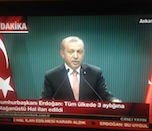Click to read the article in Turkish
I shall first note a number of prerequisites that concern this essay. First, many would say, “is there anything left in terms of law and legality.” I know there is nothing left as such; and this is the very reason of our current state of being. Second, some might say “let them go to hell; is it us who should be defending the perpetrators of coup d’état?” This invites two responses. First, if we do not defend law it becomes impossible to distinguish between who is the perpetrator of coup d’état and who is not. And then one day the rules that you defend hit you. And second, certainly if we would be different from the coup d’état perpetratorsthis can only be achieved by defending the right of the perpetrators to lawful treatment.
State of Emergency and its Decree Law
As known, in the aftermath of the July 15 coup d’état attempt, on July 20, 2016 the government announced state of emergency in Turkey. Immediately after the announcement, the first State of Emergency Decree Law was issued on the morning of July 22, 2016. (Official Gazette No. 29779). Many concerned with human rights issues emphasized the 30-day long detention period as regulated in this Decree Law. This is a very timely concern and deserves to be considered in a separate essay. But here, I shall take note of the fact that this regulation, called as State of Emergency Decree is in fact not a State of Emergency Decree Law and thus its execution should be stopped and it should be annulled.
The motives behind the announcement of the state of emergency and immediate regulation can be understood. We face with an unprecedented case of military shooting the citizens, killing more than 200, leaving thousands injured. And the President and the officials insist that the danger is not totally eliminated. Under these conditions we shall assume that their judgment is also true. The fact that the conditions tempt one to go beyond the normal measures to be taken in the face of such a threat is also understandable. Eventually, you would not consider keeping the F-16 pilots in office until their case is finalized in the court.
But this possibility also shows your limits under the state of emergency. Under state of emergency you can take emergent measures that would preempt the danger, which you cannot eliminate through ordinary means. If you go beyond this limit you can no more talk about rule of law. Therefore, each and every decision that goes beyond the requisites of the state of emergency is against law.
Constitutional court and European Court of Human Rights
The Constitutional Court had established this criterion approximately 25 years ago. According to the Court the difference between ordinary decree laws and state of emergency decree laws and the results this difference were as follows:
“In states of emergency, there is no limit to the scope of the Decree Laws, which can be enacted according to the Paragraph 3 of the Article 121 of the Constitution. However, this does not mean that the scope of the regulation of the state of emergency decree laws is limitless. The scope of the regulation of such decree laws is limited with ‘the issues that are necessitated by the state of emergency or by the state of martial law’ in accordance with the Paragraph 3 of the Article 121 and Paragraph 2 of the Article 122 of the Constitution.
It is out of question to regulate those issues, which are not necessitated by the state of emergency, by the state of emergency decree laws. The issues that are necessitated by the state of emergency are limited to the reasons and goals of the behind the state of emergency. The reasons behind the state of emergency that is in force are the expansion of cases involving violence and disruption of public order. The goal of the state of emergency is such that its goal has been intertwined with its reason. In other words, when the reasons that call for state of emergency are depicted then the element of goal is also realized. In this respect, the state of emergency decree laws shall be enacted “on issues necessitated by state of emergency.”
The decree laws that are excluded from the review of constitutionality in terms of form and essence by Article 148 of the Constitution are those enacted in ‘issues necessitated by state of emergency.’ It is a must that the Constitutional Court depict whether a state of emergency decree law that was enacted meet this criterion or not and to conduct inspection of constitutionality if the concerned decree law does not meet the criterion” (AYM, E. 1990/25, K. 1991/1, 10.1.1991)
In order to be brief, according to the ECHR, in the aftermath of the notice in accordance with Article 15 of the Convention the decision making process of the ECHR is founded on this rationale. State of emergency corresponds to an interval when additional measures can be taken in order to eliminate the risks caused by the state of emergency. And it is not a period when everything can be done. ECHR ensures this equilibrium by the principle of proportionality. The principle of proportionality prohibits going beyond the “extent strictly required by the exigencies of the crisis” (Aksoy/Turkey, para. 68).
Decree Law No. 667
Decree Law No. 667, issued on July 23, 2016 is full of provisions almost none of which can be related to the topic and period of state of emergency. I will give just one example: A public official is suspended from duty in case there is an urgent risk for public order under state of emergency; this is, in fact, the current practice. But a public official cannot be removed from office without any investigation, without being granted the right of defense. Furthermore if this is not limited to the period of state of emergency but becomes permanent, one cannot argue that this is a necessity created by state of emergency. However, paragraph 1 of Article 4 of the Decree Law states as follows:
“d) The personnel subject to the Law on Higher Education Personnel (Date: 10/Nov./1983 and No.: 2914) shall be removed from public office by the decision of the Council of Higher Education upon the resolution of the Head of the Council of Higher Education.”
Now, after reading this text someone might think and claim that “Kerem Altıparmak writes annoying texts, let’s remove him from office;” the Council of Higher Education can immediately decide to do so regardless of any defense, any investigation. But the way through which a professor shall be removed from public office and all the rights that s/he has are stated in ordinary laws. If the regulations under state of emergency change the ordinary law irrevocably it is no more a regulation under state of emergency; it rather turns out to be a regulation of lawlessness. And if you consider that tens of thousands will be subjected to this regulation you would get a clearer picture of the gravity of the situation. There is no wrong in trying to dislocate those in state offices who are responsible for the past violation of rights under the transitory periods of state of emergency, by pursuing ways that fall out of ordinary forms. This has a technical name, indeed: “lustration.” (Yet we think that Turkey is the first example throughout the world that this process is pursued without a change in the government. And this renders it ever more interesting.) However this does not mean that lustration can be pursued regardless of any rules/norms. This method shall be practiced rapidly and justly, seeing to it that the guilty and the non-guilty be distinguished.
Thus within the scope of the ECHR practices and the Reports of Venice Commission it is not difficult to conclude that the regulation of the decree law is definitely against the standards of the European Council. (Among many examples see, Ivanovski/The Former Yugoslav Republic of Macedonia; Amicus Curiae opinion prepared by the Venice Commission for Law on Lustration in Macedonia CDL-AD (2012)028-e, December 14-15, 2012).
This example can also be argued for many other provisions in the decree law. The decree law seems to get prepared without due regard to the basic principles of the rule of law. If you had not done anything for 40 years; if you had overlooked the penetration of the [Gülen] community to the highest offices in state bureaucracy, you cannot eliminate the resulting problems in 4 days. Or perhaps you might overcome the problem; but you cannot come out of this way with a strong basis, with a hopeful future. Whatever you will be doing you should do it so as to not to cause similar disasters, considering the basic principles of fair trial in an open, transparent and pluralist pattern.
Here I would like to emphasize the following: How will this process be handled? Will it be dominated by the concern that almost anyone has as to whether the next on the line will be her/him; or will it assume a course where the guilty is distinguished from the non-guilty by means of a fair trial and the perpetrators of the coup d’état are punished duly. Will the transition period be directed in way that would consider all sections in the society—as claimed—or by a quick serving out of the political preferences of those holding power in their hands. The disposition towards the State of Emergency Decree Law, which, essentially, is not a State of Emergency Decree Law is vital in this respect.
I do not know whether the Republican People’s Party (Cumhuriyet Halk Partisi) would make bold to take this issue to the Constitutional Court; and the Constitutional Court would make bold to make annulment decision under the conditions when two of its members are arrested. Nevertheless, I know that we have to defend law and justice under any condition. (KA)
Çeviri: Prof. Dr. Simten Coşar





.jpg)


